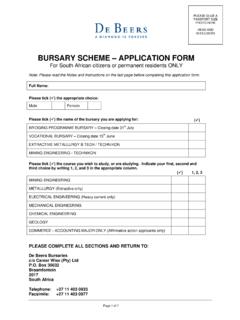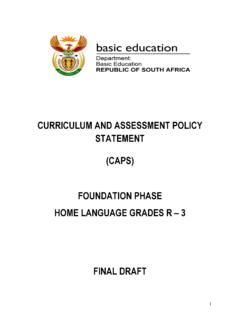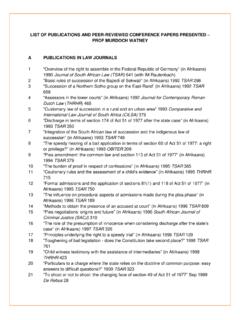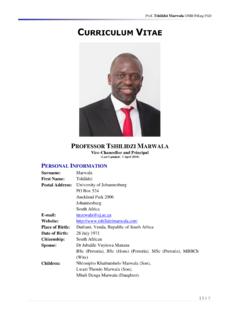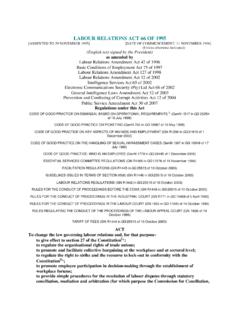Transcription of Department of Labour - University of Johannesburg
1 Downloaded from Department of Labour Amended Labour relations Act Page 1 of 155 REPUBLIC OF SOUTH AFRICA No. 66 of 1995: Labour relations Act as amended by Labour relations Amendment Act, No 42 of 1996 Proclamation, No 66 of 1996 Labour relations Amendment Act, No 127 of 1998 Labour relations Amendment Act, No 12 of 2002 ACT To change the law governing Labour relations and, for that purpose, to give effect to section 27 of the Constitution; to regulate the organisational rights of trade unions; to promote and facilitate collective bargaining at the workplace and at sectoral level; to regulate the right to strike and the recourse to lockout in conformity with the Constitution; to promote employee participation in decision,making through the establishment of workplace forums; to provide simple procedures for the resolution of Labour disputes through statutory conciliation, mediation and arbitration (for which purpose the Commission for Conciliation, Mediation and Arbitration is established), and through independent alternative dispute resolution services accredited for that purpose; to establish the Labour Court and Labour Appeal Court as superior courts, with exclusive jurisdiction to decide matters arising from the Act; to provide for a simplified procedure for the registration of trade unions and employers' organisations, and to provide for their regulation to ensure democratic practices and proper financial control; to give effect to the public international law obligations of the Republic relating to Labour relations ; to amend and repeal certain laws relating to Labour relations ; and to provide for incidental matters.
2 BE IT ENACTED by the State President and the Parliament of the Republic of South Africa, as follows:, TABLE OF CONTENTS CHAPTER ONE Purpose, Application and Interpretation 1. Purpose of this Act 2. Exclusion from application of this Act 3. Interpretation of this Act CHAPTER TWO Freedom of Association and General Protections 4. Employees' right to freedom of association 5. Protection of employees and persons seeking employment 6. Employers' right to freedom of association 7. Protection of employers' rights 8. Rights of trade unions and employers' organisations 9. Procedure for disputes 10. Burden of proof CHAPTER THREE Collective bargaining Part A: Organisational Rights 11. Trade union representativeness 12. Trade union access to workplace 13. Deduction of trade union subscriptions or levies 14. Trade union representatives 15. Leave for trade union activities 16.
3 Disclosure of information 17. Restricted rights in domestic sector 18. Right to establish thresholds of representativeness 19. Certain organisational rights for trade union party to council 20. Organisational rights in collective agreements 21. Exercise of rights conferred by this Part 22. Disputes about organisational rights Part B: Collective Agreements 23. Legal effect of collective agreement 24. Disputes about collective agreements 25. Agency shop agreements Downloaded from Department of Labour Amended Labour relations Act Page 2 of 155 26. Closed shop agreements Part C: bargaining council 27. Establishment of bargaining councils 28. Powers and functions of bargaining council 29. Registration of bargaining councils 30. Constitution of bargaining council 31. Binding nature of collective agreement concluded in bargaining council 32. Extension of collective agreement concluded in bargaining council 33.
4 Appointment and powers of designated agents of bargaining councils 34. Amalgamation of bargaining councils Part D: bargaining Councils In The Public Service 35. bargaining councils in public service 36. Public Service Coordinating bargaining council 37. bargaining councils in sectors in public service 38. Dispute resolution committee Part E: Statutory Councils 39. Application to establish statutory council 40. Establishment and registration of statutory council 41. Establishment and registration of statutory council in absence of agreement 42. Certificate of registration of statutory council 43. Powers and functions of statutory councils 44. Ministerial determinations 45. Disputes about determinations 46. Withdrawal of party from statutory council 47. Appointment of new representative of statutory council 48. Change of status of statutory council Part F: General Provisions Concerning Councils 49.
5 Representativeness of council 50. Effect of registration of council 51. Dispute resolution functions of council 52. Accreditation of council or appointment of accredited agency 53. Accounting records and audits 54. Duty to keep records and provide information to registrar 55. Delegation of functions to committee of council 56. Admission of parties to council 57. Changing constitution or name of council 58. Variation of registered scope of council 59. Winding,up of council 60. Winding,up of council by reason of insolvency 61. Cancellation of registration of council 62. Disputes about demarcation between sectors and areas 63. Disputes about Parts A and C to F CHAPTER FOUR Strikes and Lock-Outs 64. Right to strike and recourse to lockout 65. Limitations on right to strike or recourse to lockout 66. Secondary strikes 67. Strike or lockout in compliance with this Act 68.
6 Strike or lockout not in compliance with this Act 69. Picketing 70. Essential services committee 71. Designating a service as an essential service 72. Minimum services 73. Disputes about whether a service is an essential service 74. Disputes in essential services 75. Maintenance services 76. Replacement Labour 77. Protest action to promote or defend socio,economic interests of workers CHAPTER FIVE Workplace Forums 78. Definitions in this Chapter 79. General functions of workplace forum Downloaded from Department of Labour Amended Labour relations Act Page 3 of 155 80. Establishment of workplace forum 81. Trade union based workplace forum 82. Requirements for constitution of workplace forum 83. Meetings of workplace forum 84. Specific matters for consultation 85. Consultation 86. Joint decision,making 87. Review at request of newly established workplace forum 88.
7 Matters affecting more than one workplace forum in an employer's operation 89. Disclosure of information 90. Inspection and copies of documents 91. Breach of confidentiality 92. Full,time members of workplace forum 93. Dissolution of workplace forum 94. Disputes about workplace forums CHAPTER SIX Trade Unions and Employers' Organisations Part A: Registration and Regulation of Trade Unions and Employers' Organisations 95. Requirements for registration of trade unions or employers' organisations 96. Registration of trade unions or employers' organisations 97. Effect of registration of trade union or employers' organisation 98. Accounting records and audits 99. Duty to keep records 100. Duty to provide information to registrar 101. Changing constitution or name of registered trade unions or employers' organisations 102. Amalgamation of trade unions or employers' organisations 103.
8 Winding,up of registered trade unions or registered employers' organisations 104. Winding,up of trade unions or employers' organisations by reason of insolvency 105. Cancellation of registration of trade union that is no longer independent 106. Cancellation of registration of trade unions or employers' organisations Part B: Regulation of Federations of Trade Unions and Employers' Organisations 107. Regulation of federations of trade unions or employers' organisations Part C: Registrar of Labour relations 108. Appointment of registrar of Labour relations 109. Functions of registrar 110. Access to information Part D: Appeals from Registrar's Decision 111. Appeals from registrar's decision CHAPTER SEVEN Dispute Resolution Part A-Commission for Conciliation, Mediation and Arbitration 112. Establishment of Commission for Conciliation, Mediation and Arbitration 113. Independence of Commission 114.
9 Area of jurisdiction and offices of Commission 115. Functions of Commission 116. Governing body of Commission 117. Commissioners of Commission 118. Director of Commission 119. Acting director of Commission 120. Staff of Commission 121. Establishment of committees of Commission 122. Finances of Commission 123. Circumstances in which Commission may charge fees 124. Contracting by Commission, and Commission working in association with any person 125. Delegation of governing body's powers, functions and duties 126. Limitation of liability and limitation on disclosure of information Part B: Accreditation of and Subsidy to Councils and Private Agencies 127. Accreditation of councils and private agencies 128. General provisions relating to accreditation 129. Amendment of accreditation 130. Withdrawal of accreditation Downloaded from Department of Labour Amended Labour relations Act Page 4 of 155 131.
10 Application to renew accreditation 132. Subsidy to council or private agency Part C: Resolution of Disputes under Auspices of Commission 133. Resolution of disputes under auspices of Commission 134. Disputes about matters of mutual interest 135. Resolution of disputes through conciliation 136. Appointment of commissioner to resolve dispute through arbitration 137. Appointment of senior commissioner to resolve dispute through arbitration 138. General provisions for arbitration proceedings 139. Special provisions for arbitrating disputes in essential services 140. Special provisions for arbitrations about dismissals for reasons related to conduct or capacity 141. Resolution of disputes if parties consent to arbitration under auspices of Commission 142. Powers of commissioner when attempting to resolve disputes 143. Effect of arbitration awards 144. Variation and rescission of arbitration awards 145.


